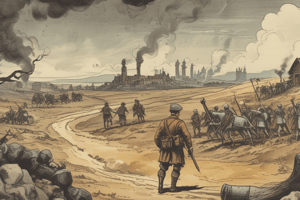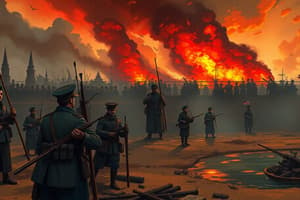Podcast
Questions and Answers
What was the immediate cause that led to the outbreak of World War I?
What was the immediate cause that led to the outbreak of World War I?
- Germany's declaration of war on Russia
- The assassination of Archduke Franz Ferdinand (correct)
- The Schlieffen Plan implementation
- The issuance of the Austrian-Hungarian ultimatum
How did Austria-Hungary's relationship with Germany influence its decision to declare war on Serbia?
How did Austria-Hungary's relationship with Germany influence its decision to declare war on Serbia?
- Germany encouraged Austria-Hungary to respect Serbian sovereignty.
- Germany issued a full military assurance called the 'blank cheque'. (correct)
- Germany provided limited support, causing Austria-Hungary to hesitate.
- Germany advised Austria-Hungary to pursue diplomatic channels only.
What was a significant goal of the Schlieffen Plan?
What was a significant goal of the Schlieffen Plan?
- To encourage other nations to join the war
- To prolong the war on two fronts
- To focus solely on defeating Russia first
- To achieve a quick victory over France before Russia could mobilize (correct)
Which of the following factors contributed to the failure of the Schlieffen Plan?
Which of the following factors contributed to the failure of the Schlieffen Plan?
What was the intended outcome of the ultimatum issued by Austria-Hungary to Serbia?
What was the intended outcome of the ultimatum issued by Austria-Hungary to Serbia?
What role did the Black Hand play in the assassination of Archduke Franz Ferdinand?
What role did the Black Hand play in the assassination of Archduke Franz Ferdinand?
Which of the following was a direct result of the assassination of Archduke Franz Ferdinand?
Which of the following was a direct result of the assassination of Archduke Franz Ferdinand?
Which geographical factor was vital to the strategy of the Schlieffen Plan?
Which geographical factor was vital to the strategy of the Schlieffen Plan?
What event sparked the chain of reactions leading to World War I?
What event sparked the chain of reactions leading to World War I?
What was the Schlieffen Plan primarily designed to achieve?
What was the Schlieffen Plan primarily designed to achieve?
How did the mobilization of armies contribute to the outbreak of World War I?
How did the mobilization of armies contribute to the outbreak of World War I?
Which of the following crises in the Balkans increased tensions prior to World War I?
Which of the following crises in the Balkans increased tensions prior to World War I?
What role did submarine warfare play during the early justification for World War I?
What role did submarine warfare play during the early justification for World War I?
What was the main concern of Austria-Hungary regarding Serbia?
What was the main concern of Austria-Hungary regarding Serbia?
Following the assassination of Archduke Franz Ferdinand, which country's actions supported Serbia?
Following the assassination of Archduke Franz Ferdinand, which country's actions supported Serbia?
What was a consequence of the Franco-Prussian War for France?
What was a consequence of the Franco-Prussian War for France?
What was the main reason behind the assassination of Archduke Franz Ferdinand?
What was the main reason behind the assassination of Archduke Franz Ferdinand?
Which event triggered Russia's mobilization during WWI?
Which event triggered Russia's mobilization during WWI?
What characterized the mobilization of armies during WWI?
What characterized the mobilization of armies during WWI?
Which conflict significantly increased tensions between Serbia and Austria-Hungary prior to WWI?
Which conflict significantly increased tensions between Serbia and Austria-Hungary prior to WWI?
What was a key factor contributing to the extension of WWI beyond initial expectations?
What was a key factor contributing to the extension of WWI beyond initial expectations?
How did submarine warfare affect public opinion in neutral countries during WWI?
How did submarine warfare affect public opinion in neutral countries during WWI?
What philosophy did President Woodrow Wilson advocate for in relation to future international relations?
What philosophy did President Woodrow Wilson advocate for in relation to future international relations?
Which of the following was NOT a direct consequence of submarine warfare during WWI?
Which of the following was NOT a direct consequence of submarine warfare during WWI?
Flashcards
Militarism
Militarism
The belief in building up strong armed forces for war.
Alliances
Alliances
Countries teaming up for protection and power balance.
Nationalism
Nationalism
Pride in one's country, and competition with others.
Imperialism
Imperialism
Signup and view all the flashcards
Assassination of Archduke Franz Ferdinand
Assassination of Archduke Franz Ferdinand
Signup and view all the flashcards
Triple Entente
Triple Entente
Signup and view all the flashcards
Franco-Prussian War
Franco-Prussian War
Signup and view all the flashcards
Serbian nationalism
Serbian nationalism
Signup and view all the flashcards
Archduke Franz Ferdinand's assassination
Archduke Franz Ferdinand's assassination
Signup and view all the flashcards
WWI Mobilization
WWI Mobilization
Signup and view all the flashcards
Balkan Wars (1912-1913)
Balkan Wars (1912-1913)
Signup and view all the flashcards
Trench Warfare
Trench Warfare
Signup and view all the flashcards
Unrestricted Submarine Warfare
Unrestricted Submarine Warfare
Signup and view all the flashcards
Lusitania sinking
Lusitania sinking
Signup and view all the flashcards
Woodrow Wilson's 14 points
Woodrow Wilson's 14 points
Signup and view all the flashcards
Total Mobilization of Nations
Total Mobilization of Nations
Signup and view all the flashcards
Austria-Hungary's Ultimatum
Austria-Hungary's Ultimatum
Signup and view all the flashcards
Germany's 'Blank Cheque'
Germany's 'Blank Cheque'
Signup and view all the flashcards
Schlieffen Plan
Schlieffen Plan
Signup and view all the flashcards
What did the Schlieffen Plan aim to solve?
What did the Schlieffen Plan aim to solve?
Signup and view all the flashcards
Bosnia and Serbia
Bosnia and Serbia
Signup and view all the flashcards
Gavrilo Princip and The Black Hand
Gavrilo Princip and The Black Hand
Signup and view all the flashcards
The Chain Reaction
The Chain Reaction
Signup and view all the flashcards
How did Austria-Hungary blame Serbia?
How did Austria-Hungary blame Serbia?
Signup and view all the flashcards
Study Notes
Long-Term Causes of WWI (MANIA)
- Militarism: European powers built up strong militaries, stockpiling weapons.
- Alliances: Complex alliances (Triple Entente and Triple Alliance) meant local conflicts could escalate.
- Nationalism: National pride and ethnic desires for independence fueled tensions.
- Imperialism: Competition for colonies in Africa and Asia increased tensions.
- Assassination: The assassination of Archduke Franz Ferdinand triggered the war.
Relationship Between Key Countries
- Serbia and Austria-Hungary: Serbia's pan-Slavic ideology clashed with Austria-Hungary's control over Slavic territories.
- Russia and Serbia: Russia supported Serbia as a fellow Slavic nation.
- Germany and Austria-Hungary: Germany supported Austria-Hungary in dealing with Serbia.
- Austria-Hungary viewed Serbia: As a threat to its empire due to growing nationalism.
Key Events
- Assassination of Archduke Franz Ferdinand: June 28, 1914, triggered a chain reaction.
- Austria-Hungary's Ultimatum to Serbia: July 23, 1914, demanding Serbia suppress anti-Austrian activities & allow investigation. Serbia rejected due to sovereignty infringement.
- Germany's support of Austria: Emboldened Austria to declare war on Serbia.
France's Reaction to Loss of Territory
- France lost Alsace and Lorraine to Germany in 1870. This created deep resentment and desire for revenge.
- This resentment influenced France's foreign policy and alliances.
The Schlieffen Plan
- German military strategy to avoid a two-front war.
- Involve a quick invasion of France through Belgium followed by pivot to fight Russia.
- Problem: Germany surrounded by potential enemies.
- Solution: Quick knock out of France, before Russia mobilised.
- Relying on: The speed of the German army, and geography, specifically the flat terrain of Belgium and northern France.
Bosnia, Gavrilo Princip, and the Black Hand
- Bosnia annexed by Austria-Hungary in 1908.
- Created resentment in Serbia.
- Gavrilo Princip, a member of the Black Hand, assassinated Archduke Franz Ferdinand.
- Princip's actions were to challenge Austrian rule over Bosnia and further the goal of Slavic independence.
The Mobilization of WWI Armies
- Rapid mobilization of armies started a chain reaction of declarations of war after the assassination of Archduke Franz Ferdinand.
- Russia mobilized to defend Serbia, leading to Germany's declaration of war on Russia, followed by France & Britain being drawn in.
The Balkan Crises Before WWI
- The Balkans were a region of intense nationalist conflicts.
- Multiple ethnic groups sought independence from the Ottoman Empire and Austria-Hungary.
- Balkan Wars (1912-1913): Enhanced tensions with Serbia expanding its territory which increased tensions with Austria-Hungary.
- The assassination of Archduke Franz Ferdinand in Sarajevo was a direct consequence of this volatility.
WWI's Extended Duration
- Trench warfare: On the Western Front, made advances slow and costly.
- New weapons: Machine guns, tanks, poison gas created a deadly stalemate.
- Total mobilization: of nations led to long and exhausting campaigns.
- Strategic errors and poor communication: Contributed to an extended conflict.
Woodrow Wilson's Philosophy and the 14 Points
- Wilson's Philosophy: Believed in democracy, self-determination, and international cooperation to ensure peace without victory.
- 14 Points: Included open diplomacy, free trade, reduction of armaments, and the creation of the League of Nations.
Imperialism
- European powers competed for colonies, leading to rivalry and tension which fueled world war one.
Canadian Conscription Crisis
- 1917 Military Service Act: Introduced conscription (compulsory military service) to meet the demand for soldiers during WWI.
- Protests and unrest: Led to widespread protests and political unrest in Canada due to cultural, linguistic differences & resentment toward the war effort.
Studying That Suits You
Use AI to generate personalized quizzes and flashcards to suit your learning preferences.




